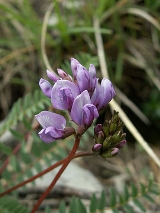
Oxytropis
Encyclopedia
Oxytropis is a genus of plants in the legume family. It is one of two genera of plants known as locoweeds, and are notorious for being toxic to grazing animals. The other locoweed
genus is the closely related Astragalus
. There are about 300 species native to Eurasia and North America. Several species are native to the Arctic
. These are hairy perennial plants which produce raceme
inflorescence
s of pink, purple, white, or yellow flowers which are generally pea-like but have distinctive sharply beaked keels. The plant produces legume pods containing the seeds.
Selected species:
Locoweed
Locoweed is a common name in North America for any plant that produces swainsonine, a phytotoxin harmful to livestock. Worldwide, swainsonine is produced by a small number of species, most in three genera of the flowering plant family Fabaceae: Oxytropis and Astragalus in North America, and...
genus is the closely related Astragalus
Astragalus
Astragalus is a large genus of about 3,000 species of herbs and small shrubs, belonging to the legume family Fabaceae, subfamily Faboideae. The genus is native to temperate regions of the Northern Hemisphere...
. There are about 300 species native to Eurasia and North America. Several species are native to the Arctic
Arctic
The Arctic is a region located at the northern-most part of the Earth. The Arctic consists of the Arctic Ocean and parts of Canada, Russia, Greenland, the United States, Norway, Sweden, Finland, and Iceland. The Arctic region consists of a vast, ice-covered ocean, surrounded by treeless permafrost...
. These are hairy perennial plants which produce raceme
Raceme
A raceme is a type of inflorescence that is unbranched and indeterminate and bears pedicellate flowers — flowers having short floral stalks called pedicels — along the axis. In botany, axis means a shoot, in this case one bearing the flowers. In a raceme, the oldest flowers are borne...
inflorescence
Inflorescence
An inflorescence is a group or cluster of flowers arranged on a stem that is composed of a main branch or a complicated arrangement of branches. Strictly, it is the part of the shoot of seed plants where flowers are formed and which is accordingly modified...
s of pink, purple, white, or yellow flowers which are generally pea-like but have distinctive sharply beaked keels. The plant produces legume pods containing the seeds.
Selected species:
- Oxytropis arctica - Arctic locoweed
- Oxytropis bella
- Oxytropis borealis - boreal locoweed
- Oxytropis campestrisOxytropis campestrisOxytropis campestris is a plant native to the Northwestern United States and all Canada, sometimes grown as an ornamental plant.It is found in prairies, woods, and meadows, and prefers gravelly and rocky slopes, where it grows most abundantly. The plant has numerous...
- field locoweed - Oxytropis deflexa - nodding locoweed
- Oxytropis jaquinii
- Oxytropis kobukensis - Kobuk locoweed
- Oxytropis lambertiiOxytropis lambertiiOxytropis lambertii is a species of flowering plant in the legume family known by several common names, including purple locoweed, woolly locoweed, and Lambert crazyweed.-Distribution:...
- purple locoweed - Oxytropis monticola - yellow-flowered locoweed
- Oxytropis nitens
- Oxytropis oreophila - mountain oxytrope
- Oxytropis oxyphylla
- Oxytropis parryi - Parry's locoweed
- Oxytropis prostrata
- Oxytropis pseudoglandulosa
- Oxytropis riparia - Oxus locoweed
- Oxytropis sericea - white locoweed
- Oxytropis strobilacea
- Oxytropis todomoshiriensis

